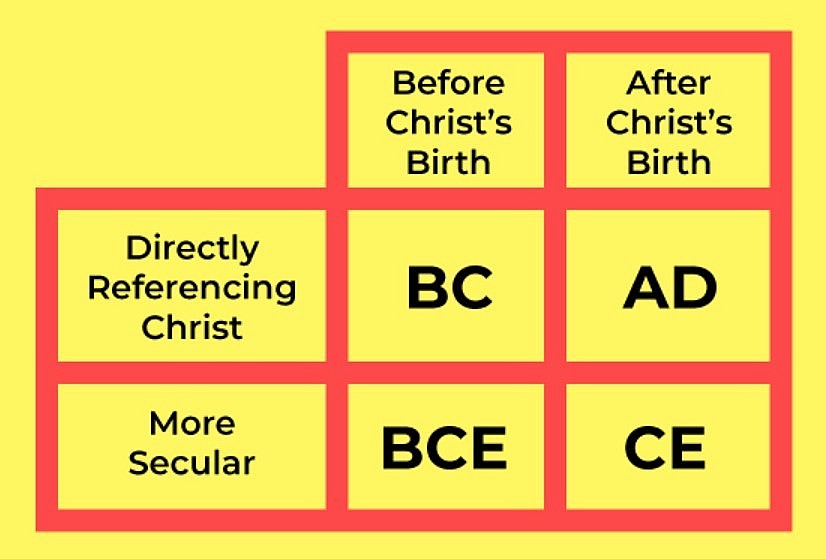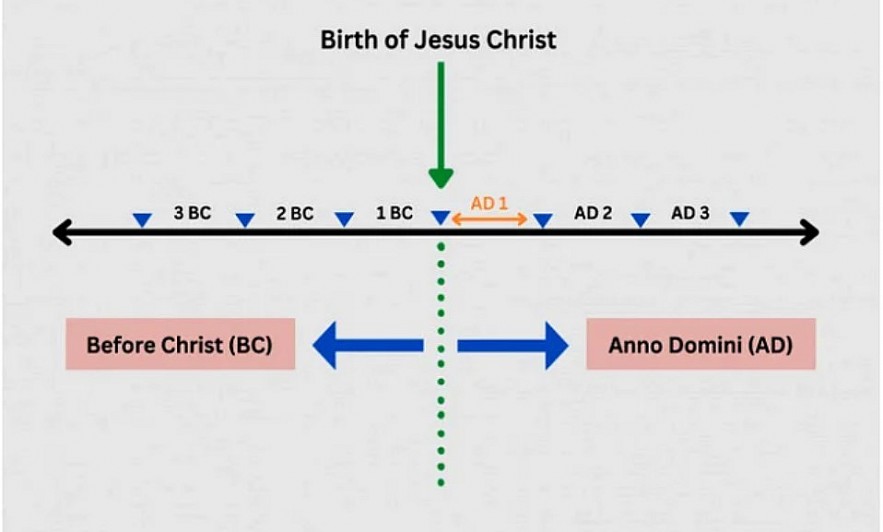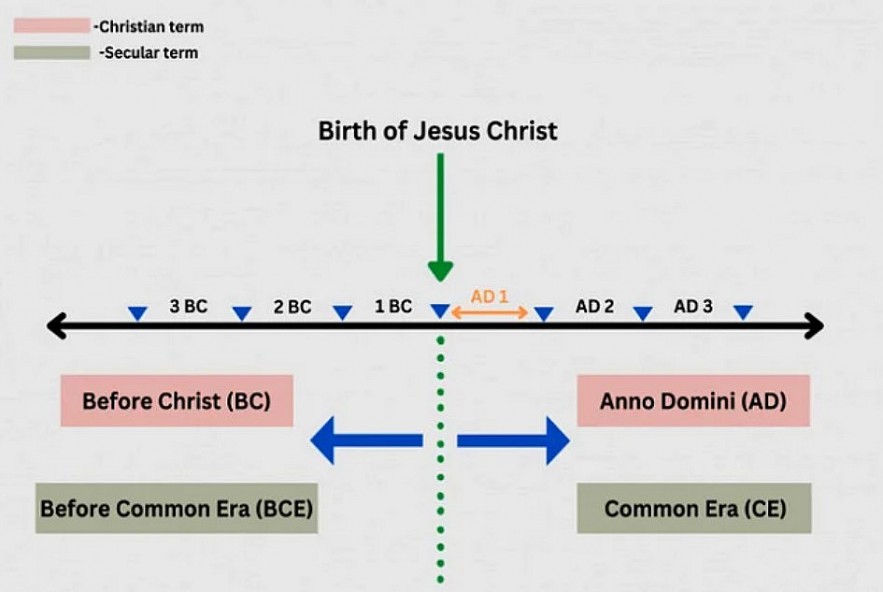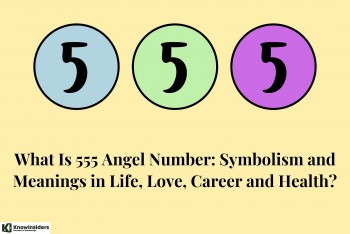BC and AD, BCE and CE Timelines: Origin, Meanings And Differences
| Table of Contents |
 |
| BC,AD,BCE and CE |
It is the Gregorian calendar that is used to keep track of dates. It was first used in the Western Christian tradition. After that, people of all religions, cultures, and languages used it all over the world. The Gregorian calendar, which is based on the date people say Jesus Christ was born, is another name for it.
Years that happen after this event are written as AD or CE, while years that came before it are written as BC or BCE. Labels like BC and AD are used to keep track of the years.
But what's the difference between BC and BCE or AD and CE? Which one should we use if they both mean the same thing?
Video: What Is the Difference Between BC-AD and BCE-CE?
BC and AD
Christian monk Dionysius Exiguus came up with the idea to count years from the birth of Jesus Christ in the year 525. After being standardized by the Julian and Gregorian calendars, the system spread across Europe and the rest of the Christian world over the next few hundred years.
With BC and AD, you can keep track of how many years have passed. AD stands for "Anno Domini," a Latin phrase that means "Year of Our Lord" in English. BC stands for "Before Christ."
The BC/AD dating system is based on the date that Jesus Christ was born, which is seen as the most important starting point. "Before Christ" (BC) stands for the number of years that passed before Christ was born. The time after Christ was born is called AD, or Anno Domini.
 |
| Timeline showing AD and BC |
Examples of BC used in Sentences
• In 776 BC, the 1st Olympic Games were held.
• In 44 BC, Julius Caesar was assassinated.
• Around 2500 BC, pyramids were built by ancient Egyptians.
Examples of AD used in Sentences
• William Shakespeare was born in 1564 AD.
• The COVID-19 pandemic began in 2019 AD.
• In 1775 AD, the Revolutionary War began.
BCE and CE
CE stands for "common era" or "present era," and BCE stands for "before the common era" or "present era." These terms can be used instead of BC and AD. These letters are not as old as BC and AD, but they have been used since at least the early 1700s.
Jews have been using them for more than 100 years, but they became more common in the last few decades of the 20th century, replacing BC/AD in many fields, especially science and academia.
 |
| Timeline showing AD, BC, CE, and BCE |
Examples of BCE used in Sentences
• “A Babylonian in 1750 BCE would have had to labor fifty hours to spend one hour reading his cuneiform tablets by a sesame-oil lamp.”—Steven Pinker, Enlightenment Now
• The first introduction to the Gilgamesh Epic is Five Sumerian poems dating from 2100 BCE.
• The first complex Mayan societies existed from 2000 BCE to 250 CE.
Examples of CE used in Sentences
• “The fire burned on under the cauldron of our culture, and the next doubling of our population would only take 1200 years (0–1200 CE).”—Daniel Quinn, The Story of B
• The first complex Mayan societies existed from 2000 BCE to 250 CE.
• The Yayoi period in Japan lasted from 300 BCE to 300 CE.
Historical Origin
Dionysius Exiguus, a Christian monk, was the first person to suggest dividing time by the birth of Christ.
In the Diocletian era, before the BC/AD system was put in place, the years were named after the Roman emperor Diocletian. Many Christians were persecuted by him during his rule. In this way, Dionysius wanted to get rid of this system and, by extension, the emperor's memory. That's why he created the AD system in the year 525. At that time, the BC dating system wasn't even thought of yet.
Soon, people all over Europe knew about the Anno Domini system, which is also called the Christian or Dionysian reign. But it wasn't until the eighth century that it became really popular.
Bede, another English monk from this time, used this method of dating in his book "Ecclesiastical History of the English People." But it did more than just make the AD system more popular; it also brought up the idea of BC.
It is important to remember that Bede did not use the phrase "Before Christ." In one case, he only talked about the time before Christ was born. 'Before Christ' didn't even exist until a lot later.
How BCE and CE differ from BC/AD
BCE and CE stand for 'Before Common Era' and 'Common Era', respectively. The first refers to BC, while the second refers to AD. Thus, AD 1 and 1 CE represent the same year. These terms were first used in the seventeenth century.
Please keep in mind that, unlike the BC/AD system, the new system uses an after-the-year format for both BCE and CE.
Why was the BCE/CE system created?To include people of all religions, the historically used names BC and AD were changed to BCE and CE. This system has been used by Jewish academics for more than one hundred years. They were the first people to adopt it. They said the BC/AD system was controversial because it had its roots in Christianity. They thought it might be offensive to people who are not Christians since the Gregorian calendar had become important around the world. A mistake in the date of Jesus Christ's birth was another reason for using this system. A lot of people thought that Christ was born two years before AD 1. That would mean that the AD/BC system is wrong. In this case, the BCE/CE system worked better. The reason for this was that it didn't say which date was the birth date of Jesus. One CE (or AD 1) was still used as the starting point, though, as was the norm. During the "Vulgar era" in the 1600s, the terms CE and BCE came into use. However, the definition of vulgar does not match the modern meaning of the word, which means rude or inappropriate. Instead, it comes from the Latin word "vulgaris," which means "normal" or "common." So, the name of this era was chosen with regular people in mind. |
BC/AD and BCE/CE: Use of Dating System Today
However, the BC/AD system is still widely used around the world, even though the BCE/CE system was created as an alternative.
Stats show that most people who don't like the new system do so because they think it takes away from the importance of Jesus Christ.
Others say it's okay because the Gregorian calendar is supposed to be a Christian calendar, so making a secular dating system doesn't make sense.
Some people also say that both of these systems could make things more difficult for everyone. That way, you can choose the dating system that works best for you.
Academic and scientific texts, on the other hand, tend to use BCE/CE. Both systems are used regularly and have strong arguments for them, so we don't think one is better than the other. If writers have a choice, they can use their own system or the system that their readers want. However, they should be consistent with their choice, so BC and CE should not be used together, or vice versa. There are also some rules about typography to keep in mind:
• BC should appear after the numerical year, while AD should appear before it.
1100 BC, AD 1066
• BCE and CE should both appear after the numerical year.
1100 BCE, 1066 CE
• As is the case with most initialisms, periods may be used after each letter.
1100 B.C., A.D. 1066, 1100 B.C.E., 1066 C.E.
• Some style guides recommend writing BC, AD, BCE and CE in small caps.
AD 2017
Of course, writers don't have to make that choice very often. The difference between BCE and CE (or BC and AD) is usually not needed outside of historical contexts, and it is generally understood that when the year is not given, it is CE (or AD). Because of this, dates from the last few hundred years don't usually have CE (or AD) next to them.
Frequently Asked Questions
Where does the term AD come from in the Bible?
The term AD comes from the Latin term meaning “the year of our Lord”.
What do BC & AD, BCE & CE mean?
The full form ofBC is”before Christ”. AD stands for Anno Domini. The full form of BCE is ”before the common (or current) era” .CE means ”common (or current) era” .
Why have some people adopted BCE/CE?
Religious neutrality can be seen as a major reason for adopting BCE/CE.
Is there a difference between BC & AD?
Yes, BC stands for "before Christ" and AD for "after Christ." The year we live in now is 2023 AD, which means that Jesus was born 2023 years ago.
Are AD 100 & 100 CE the same?
Yes, both years are the same. The only difference is about changing the semantics or the terms. AD 100 & 100 CE are both 100 years after the birth of Jesus.
Why do people use BCE & CE instead of BC & AD?
People don't use the phrase "Before Christ" because it has a religious meaning, so they use "BCE" instead. CE and BCE are used by people who aren't religious or Christian.
Where do I put BC & AD when I am dating something?
For most dates, BC and AD are used at the end of the string. That is, 50 BC will be written if something happened 50 years before Jesus was born. But if it's years after Jesus was born, it will be written with AD before the year. This is the year 2023 AD.
What Does BC Stand For?
BC stands for Before Christ & it’s a way of counting years before the estimated birth of Jesus Christ. BC starts with the year before Christ’s birth, 1 BC & counts backward to the year 10,000 BC.
What Does AD Stand For ?
AD stands for Anno Domini, which is Latin for in the year of the Lord. It’s a way of counting years based on the estimated birth of Jesus Christ.
What Does BCE Stand For?
BCE stands for "Before Common Era." This abbreviation is used by people who don't want to connect years or history to a certain religious meaning. It does the same thing as BCE, but it doesn't talk about Christ.
In the same way that CE is a less religious way to say AD, BCE is a less religious way to say BC. 500 BCE is the same year as 500 BC.
What Does CE Stand For?
Common Era, or CE, is the same as AD in terms of how it works. It has nothing to do with religion, so people who follow the Gregorian calendar or study history in school but don't like AD use CE instead.
English speakers around the world follow religions other than Christianity, so it doesn't make sense to mark all calendars based on a single religion. That's why CE is a better way to say AD than AD.
 Most Common Dreams In Every Country In The World - According to Google Search Most Common Dreams In Every Country In The World - According to Google Search The research team analyzed Google search data to reveal the dream obsessions of Americans, Australians, French, Germans, Vietnamese, etc. Take a look at some of ... |
 What is Ghost Month - Hungry Ghost Festival: Taboos, Meanings, Superstitions and Beliefs What is Ghost Month - Hungry Ghost Festival: Taboos, Meanings, Superstitions and Beliefs According to folklore in China, Vietnam and many countries in Asia, the 7th lunar month is a ghost month that brings bad luck and insecurity ... |
 Little-Known Facts: Lily of the Valley Flower Little-Known Facts: Lily of the Valley Flower Lily of the valley is a flowering plant and one of the most sought after flowers for its sweet scent and delicate bell like petals ... |
 What Is 555 Angel Number: Symbolism and Meanings in Life, Love, Career and Health? What Is 555 Angel Number: Symbolism and Meanings in Life, Love, Career and Health? The number 555 carries diverse meanings across different contexts, often symbolizing change, transformation, and new beginnings. Here are its symbolism, significance and meanings in love, ... |
























